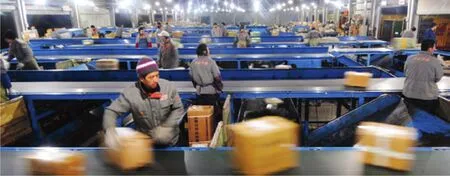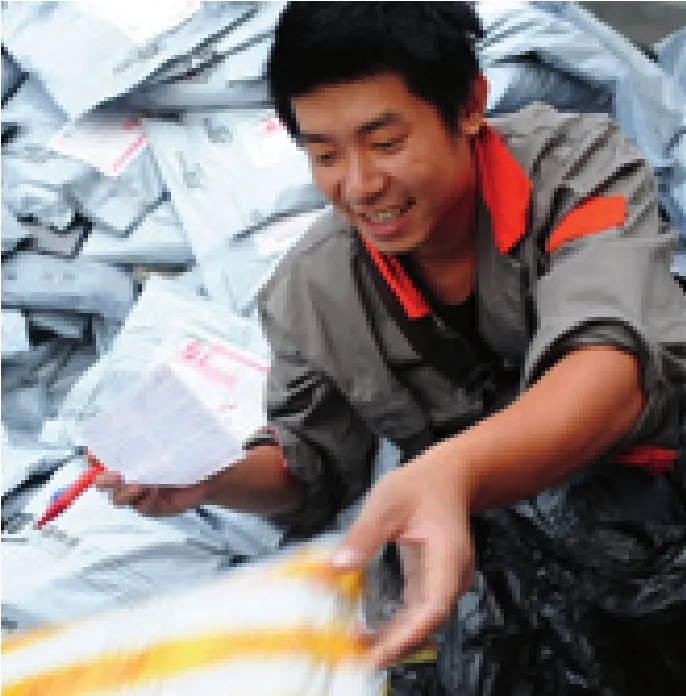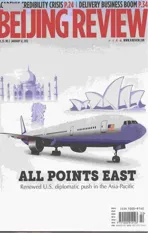Delivering Satisfaction
2012-10-14LiuXinlian
Delivering Satisfaction
China steps up efforts to improve its fledgling express delivery industry By Liu Xinlian

FAST MOVING: Workers transfer packages at STO’s east China center in Hangzhou, capital of Zhejiang Province
With more Chinese customers abandoning bricks-and-mortar department stores in favor of online alternatives, express delivery services have sprouted up in recent years, riding the heels of the online shopping craze. Unfortunately for customers, delivery companies are renowned for providing unreliable service,sparking consumer ire and quickly becoming the bane of most netizens’ online shopping experiences.
Add to that rising fees. In December 2011,Shanghai-based ZTO and Yunda announced increase in delivery fees by 1 yuan, citing operational costs to improve services for the increases.
China’s express delivery industry is known for its two “lows”: low prices, but low service quality. And increasing prices do not guarantee better service, said Xu Yong,President of Cecss.com, an express consulting website based in Shanghai.
Fees and false promises haven’t been customers’ only complaints for the country’s express delivery industry. Delivery delays,missing purchases and unregulated charges have also caused customer confidence to sway, said the State Post Bureau (SPB). Lack of delivery services during peak seasons has also sparked customer discontent. In November 2011, complaints went up almost 60 percent from the previous year.
Strengthen regulation
Now, as express services become a daily necessity with the rising popularity of online shopping,the government is looking to enhance the booming, yet disorganized, industry.
According to the SPB, China had 5,883 licensed express fi rms by the end of 2010. Among them, only six had annual revenue exceeding 2 billion yuan ($317.5 million) and two had more than 10 billion yuan ($1.59 billion).
“Obviously, the situation of China’s express delivery industry is still in its infancy.In the United States, the top couriers had the market share of 95 percent,” Xu said.
The market also has a lower access threshold for private express companies—all that’s needed for a startup is a phone line, several couriers and an electric bike—resulting in a soaring number of express enterprises and blind expansion, according to a report released by Zero2IPO Research Center.
Most private delivery firms are franchisees, said Xu. It is hard to regulate the service quality of franchisees.
Xu suggested that a viable way for delivery firms to improve service and foster brands is to revoke the franchise and establish proprietary branches under their direct control.
The SPB in June 2011 announced suspensions for 56 unlicensed express enterprises,mostly franchised outlets of the country’s four major express delivery networks: ZTO, STO,Yunda and Yuantong.
Meanwhile, on August 30, the SPB created the country’s first rating standard for express delivery companies.
The standard divides express delivery companies into four grades, from two star to fi ve star, based on their size, coverage, market share, IT application level and service quality.
“The standard is very important. On the one hand, it can regulate express delivery companies and improve their services. On the other, it urges companies to rise above the current cycle of lowprice competition with similar services,” said Qi Hui, an analyst at market research firm China Express Consulting.
The SPB has already stepped in. On August 11, it issued a set of regulations to standardize operation of express delivery business. It aims to regulate the problems existed in the country’s express delivery service, such as rough handing,delay and loss, said Xu.
On the last day of 2011, the SPB released its 12th Five-Year Plan (2011-15) for the express delivery industry. Strengthening the industry, fostering strong enterprises and creating stronger brands were among the main targets for the industry.
The plan aims to improve the overall service quality of the express delivery industry while accelerating mergers and acquisitions of smaller services to root out unqualified companies, Liang Huanlei, an analyst with Distribution Productivity Promotion Center of China Commerce told the Beijing-based dailyInternational Financial News.
Expectations are that the government will push the express delivery industry to more than double its revenue to 143 billion yuan($22.7 billion) by 2015, with an average annual growth of 20 percent, according to the SPB’s plan. More than 6.1 billion deliveries will be made by 2015, representing an annual growth of 21 percent.
By then, the express delivery industry will also have created more than 350,000 new jobs, employing 1 million people. According to the SPB, China’s express delivery industry hired 542,000 people at the end of 2010.
Fundamental changes to the industry are needed. Efforts should be made to enhance administration and stability of the delivery service network. Advanced technological practices will be adopted to track and handle packages. Most importantly will be a shift in priorities from speed and scale to quality services.
Calling all couriers
“No matter how hard we try to improve our transportation means, distribution networks and delivery services, we just can’t keep up with the increasing business volume,” said Chen Dejun, President of STO, a Shanghai-based express delivery fi rm.
Online shopping since a Single’s Day(November 11, 2011) promotion has seriously overstrained China’s delivery firms. Statistics from Taobao, a leading e-commerce website in China, show that purchases on that day topped 5.2 billion yuan ($816 million), with 28.5 million gifts being whisked around the country.
According to the SPB, China’s express delivery fi rms made 390 million deliveries in November alone, a year-on-year increase of 69.7 percent.
Delivery men hardly had time to catch their breath when the Double 12 (December 12, 2011) promotion, Christmas and the New Year spurred new online buying sprees. Between December 26 and 31, 16 million deliveries were made per day, 63.3 percent higher than the previous year, according to the SPB.

PILES OF PACKAGES: A delivery man gets a parcel from his client in Hangzhou, capital of Zhejiang Province
Now, some express delivery fi rms are on the brink of putting limits on or halting outright the acceptance of new parcels in the run up to China’s Spring Festival, which falls on January 23, said Xu.
The SPB issued a directive on December 21 requiring all delivery companies to maintain normal operations during the year-end delivery period or face a revocation of their license.
But soaring demand does not necessarily equate to higher pro fi ts.
“During peak seasons, express delivery companies have to hire more couriers and rent more trucks, which eats into the couriers’pro fi ts,” said Xu.
曾祥芹先生提交了两篇论文,一篇《曾子是<大学> 的解经传主》,从文章版本学、文章阅读学、文章写作学的视点,论证学术界争论已久、悬而未解的难题:《大学》的作者,给出了研究历史文化的一个新的思路。在《论曾子 <大学> 的章法结构》一文中,曾祥芹先生提出“书本是文章的最大单位”这一重要命题,他认为不研究“书本型”的文章,将会大大缩小文章学的视野,不利于文章价值的发掘。曾祥芹先生通过对《大学》逐句的微观的细腻的考察,理清《大学》句间关系,进而考察章间关系,梳理出《大学》组句成章、组章成书的章法结构,由此揭示了文章传播学在语言结构上的变通原则和包容精神。大学大学
Xu suggested that e-commerce companies should promote sales for a week rather than a day.
“The concentration of transactions on one day makes it dif fi cult for delivery companies to guarantee service,” Xu said.
It also puts a dent in service quality, Xu said.
Wang Tao, a courier in Beijing, has worked 14 hours every day since mid-November to deliver at least 180 parcels a day.
“I had to ride more than 100 km, make at least 180 phone calls and climb 100 fl oors every day,” Wang said.
For his labor, Wang earned 1.3 yuan($0.21) for every parcel he delivered and around 5,000 yuan ($793.65) a month.
“I don’t think people realize how much work and strain goes into this job,” Wang said.
According to Chen, the STO now has more than 100,000 couriers and will be looking to hire another 10,000 a year over the next few years.
Even as express delivery fi rms hire more couriers, a greater number of delivery people are leaving their jobs, said Xu.
“Many feel they aren’t achieving anything.Others feel it’s a dead-end job,” said Xu.
Express delivery fi rms need to take steps to stabilize their staff, Xu said.
The SPB’s plan also described the need for professional training for couriers. By the end of 2015, a professional training project will be launched in around 100 universities and train at least 50,000 express delivery professionals.
